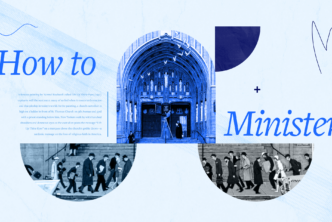My first month in seminary, I thought I was the skubala.
When I imagined myself in the pulpit, I could bring down the fire like Spurgeon. That’s because I had a little Greek under my belt, preached a few sermons at our small KJV-only Baptist church, and spent the past decade working as an actor (seriously working, not just waiting tables). I was Spurgeon-level good—and I could prove it. Probably four people complimented me each time I taught at Bible studies, which is quite a lot in a church of twenty members. And in my mind, when four people affirmed my preaching, that meant at least another four (or ten?) people liked the sermon but were too shy to say anything. Yeah, 50–80 percent of people who listened to my sermons liked them. And most importantly, my pastor was one of the people who said “good job” afterward. I always glowed with gratitude (definitely not pride). My wife even told me she was edified, her head tilted slightly to the side, nodding with adoration, as she does.
So when it was my turn to preach in front of a class of 30 other students, I was ready to go. Who cared about the grade? My goal was solely to “edify these people.” But because I also had thought about making God great and preaching Christ, I wore my nicest suit, my best tie, and a crisp white dress shirt—and coiffed my hair, shaved, wore cologne, and put on some deodorant. My wife came along at my invitation, even though I warned her that I was only given fifteen minutes in class—unlike my hour-long sermons at Bible study. I noticed her disappointment (short sermons are sinful, you know). But this was my first seminary preaching experience, and I wanted her present to tell me afterward how life-changing my message was.
I sat patiently, mostly, my leg bouncing up and down as other students gave their mini-sermons from the front. Our homiletics professor was a towering former college football player with a deep, resonant baritone. He sounded like I imagined God would sound in those passages with divine speech, like those in Isaiah or Job: the Great Baritone whose voice shakes mountains. The professor’s voice, heartening to his congregants, shook the confidence of those untested seminary students.
I heard nothing any of the other men said for 45 minutes. It didn’t matter; I needed to concentrate on my words, my sermon—for their edification. So I doodled on my preaching manuscript, one-half page of bullet points on Hebrews 6:13–20, that glorious text in which the unknown author (hold your opinions on that one for now, please) expounds the glorious promise of the gospel in terms of the Abrahamic covenant and Christ, the anchor of our faith. I just knew I was going to blow these other students—and my God-voiced professor—out of their seats with my fresh take on this passage.
My turn finally came. I sprang up to the front, arranged my Bible and notes, and looked around the room, trying to suppress the urge to smile. They had no idea what was coming.
For fifteen minutes, I unleashed a menagerie of beautifully discombobulated metaphors on ships’ anchors, fleet-footed princes, and big granite rocks. Then I solemnly closed my Bible and rummaged through my notes while receiving feedback from the other students, like a White House press secretary fielding questions from a high school journalism class.
And then it happened. The thing that to this very day digs a hole in my gut. The Great Baritone boomed, “Well done.” I stepped away from the front and walked to his desk to hand him my notes. And then he asked me the same question he asked every student: “How many sermons have you preached?”
I smiled and said, “That was my first one.”
Liar. You rotten liar.
I said those words as I returned to my seat, looking out across a room of attentive faces. Instantly, I sensed my white shirt grow damp as it clung to the wet skin of my sweating torso, my forehead glistening, and I heard my black dress shoes thudding on the carpet. And as that lie echoed across the room, I saw the expressions of curiosity on those faces change to cringes of disappointment.
They knew.
They knew I lied, and now they also knew I was an arrogant poser. All those weeks leading up to this moment, when I acted so nice and friendly and humble to build a facade of felicity, peeled off my face like a bad hot wax treatment leaving burned and boiled skin underneath.
The words I spoke and the tone I used threw the blanket off my hidden trophy of pride. Like Jacob’s wives, I had tried to conceal the evidence of my idolatry. But with only two simple words, my professor had exposed my nakedness. “Well done” was my undoing.
My wife later confronted me about my lack of honesty. “You’ve preached before. Why didn’t you say that?” I justified my lie, wrangling together a mishmash of excuses, wordsmithing better than I had in the sermon. She listened, shook her head gently side to side, and smiled with concern, “You don’t need to do that. Just preach, then sit back down.”
I’ve carried those words with me for a decade. Every time I preached after that, it’s been the same: stand up, deliver, sit down. My least-proud moment in seminary taught me through a blatant and embarrassing lie to speak truth both in the pulpit—and when stepping away from it.
Books & courses on preaching you might like






